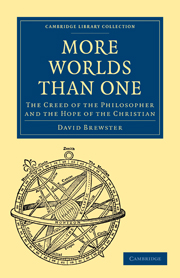Book contents
- Frontmatter
- Contents
- PREFACE
- INTRODUCTION
- CHAP. I Religious Aspect of the Question
- CHAP. II Description of the Solar System
- CHAP. III The Geological Condition of the Earth
- CHAP. IV Analogy between the Earth and the other Planets
- CHAP. V The Sun, Moon, Satellites, and Asteroids
- CHAP. VI The Motion of the Solar System round a distant Centre
- CHAP. VII Religious Difficulties
- CHAP. VIII Single Stars and Binary Systems
- CHAP. IX Clusters of Stars and Nebulæ
- CHAP. X General Summary
- CHAP. XI Reply to Objections drawn from Geology
- CHAP. XII Objections from the Nature of Nebulæ
- CHAP. XIII Objections from the Nature of the Fixed Stars and Binary Systems
- CHAP. XIV Objections from the Nature of the Planets
- CHAP. XV The Future of the Universe
CHAP. XII - Objections from the Nature of Nebulæ
Published online by Cambridge University Press: 29 August 2010
- Frontmatter
- Contents
- PREFACE
- INTRODUCTION
- CHAP. I Religious Aspect of the Question
- CHAP. II Description of the Solar System
- CHAP. III The Geological Condition of the Earth
- CHAP. IV Analogy between the Earth and the other Planets
- CHAP. V The Sun, Moon, Satellites, and Asteroids
- CHAP. VI The Motion of the Solar System round a distant Centre
- CHAP. VII Religious Difficulties
- CHAP. VIII Single Stars and Binary Systems
- CHAP. IX Clusters of Stars and Nebulæ
- CHAP. X General Summary
- CHAP. XI Reply to Objections drawn from Geology
- CHAP. XII Objections from the Nature of Nebulæ
- CHAP. XIII Objections from the Nature of the Fixed Stars and Binary Systems
- CHAP. XIV Objections from the Nature of the Planets
- CHAP. XV The Future of the Universe
Summary
In a preceding chapter on nebulæ, we trust we have satisfied the candid inquirer that all nebulæ are clusters of stars, and that, there is no proof whatever, not even the shadow of proof, that in the sidereal regions there is what is called nebulous matter, either existing in a stationary condition, or aggregating into stars. The author of the Essay Of the Plurality of Worlds, whose astronomical objections to the doctrine of a plurality of worlds we are about to consider, very dexterously commences his argument with an attack upon that part of the doctrine which relates to nebulæ. He is not content with the statement of facts, but he attempts to throw ridicule upon his opponents by the application of words which are calculated to influence the minds of ignorant or inattentive readers. By calling nebulæ clouds, and pieces of comets' tails, and the stars into which they are resolved, shining dots, pieces of bright curd, luminous grains, and lumps of light, he fancies that he has demolished the opinion of astronomers that these dots are suns; that they are “as far from each other as the dog-star” is from us; that each sun has its system of planets, and each planet its animal and vegetable life.
- Type
- Chapter
- Information
- More Worlds Than OneThe Creed of the Philosopher and the Hope of the Christian, pp. 209 - 218Publisher: Cambridge University PressPrint publication year: 2009First published in: 1854

